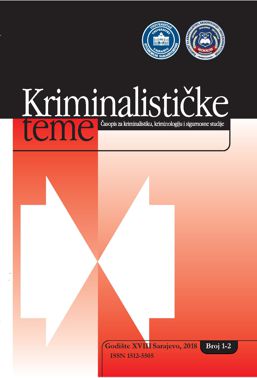STRAH OD TERORIZMA I TERORISTIČKIH AKATA MEĐU STUDENTSKOM POPULACIJOM
FEAR OF TERRORISM AND TERRORIST ACTS AMONG THE STUDENT POPULATION
Author(s): Almir PustahijaSubject(s): Media studies, Security and defense, Higher Education , Social psychology and group interaction, Criminology, Demography and human biology, Social Informatics, Peace and Conflict Studies
Published by: Fakultet za kriminalistiku, kriminologiju i sigurnosne studije Univerziteta u Sarajevu
Keywords: fear of terrorism and terrorist acts; security; student population;
Summary/Abstract: Reason(s) for writing and research problem(s): Theoretically and structurally, work is inspired by the author’s attempt to scientifically verify whether the amount of fear of terrorism and terrorist acts in the student population has influenced significant differences in the intensity of fear of terrorism and terrorist attacks and the interest for the information about the same (using different types of media as a source of information about terrorism), but also taking into account gender of the respondents, their geographical location and etc. Aims of the paper (scientific and/or social): The paper will try to examine fear of terrorism as such, primarily in Bosnia and Herzegovina, with the primary purpose of devoting greater attention to this issue as a scientific category, in addition to the already existing strategic political or more frequent journalistic sensationalist approach. Methodology/Design: Fundamental methods which represent the basis for this research are the analysis of primary data collected by survey research using the methods of content analysis, description, classification and specialization, comparative method and statistical methods for analysis of empirical data. Research/paper limitations: The limitations of this research may be inflicted by the impossibility of conducting research in more cities, in addition to the research conducted in Belgrade (Serbia), Split (Croatia) and Sarajevo (Bosnia and Herzegovina), but also taking into account the social environment that either has or hasn’t been exposed to acts of terrorism or terroristic threats. Results/Findings: The research was conducted at the Faculty of Law at the University of Belgrade (Serbia), Faculty of Law at the University of Split (Croatia), Faculty of Criminalistics, Criminology and Security Studies and the Faculty of Political Science at the University of Sarajevo (Bosnia and Herzegovina) on the sample of 1200 respondents, taking into account the local environment of security culture and terroristic threats, opportunities and risks of terrorism in these areas. The results have shown that gender is a significant predictor of fear of terrorism and terrorist attacks, but also there are statistically significant differences in the intensity of fear of terrorism and terrorist attacks when we compare those three states. In addition, there is no statistically significant difference in intensity of fear of terrorism and interest in getting information about terrorism with exception of the examinees from Bosnia and Herzegovina, as well as there is no correlation with the use of media in gathering information about acts of terrorism. General conclusion: Regardless of its extent, fear of terrorism and terrorist acts exist, and it is therefore important to continue research of this issue. Research/paper validity: The justification of the paper is in the fact that it represents beginning of a scientific research in the local community and will certainly stimulate future research in this area.
Journal: Kriminalističke teme – Časopis za kriminalistiku, kriminologiju i sigurnosne studije
- Issue Year: XVIII/2018
- Issue No: 1-2
- Page Range: 23-58
- Page Count: 36
- Language: Bosnian, Croatian, Serbian

